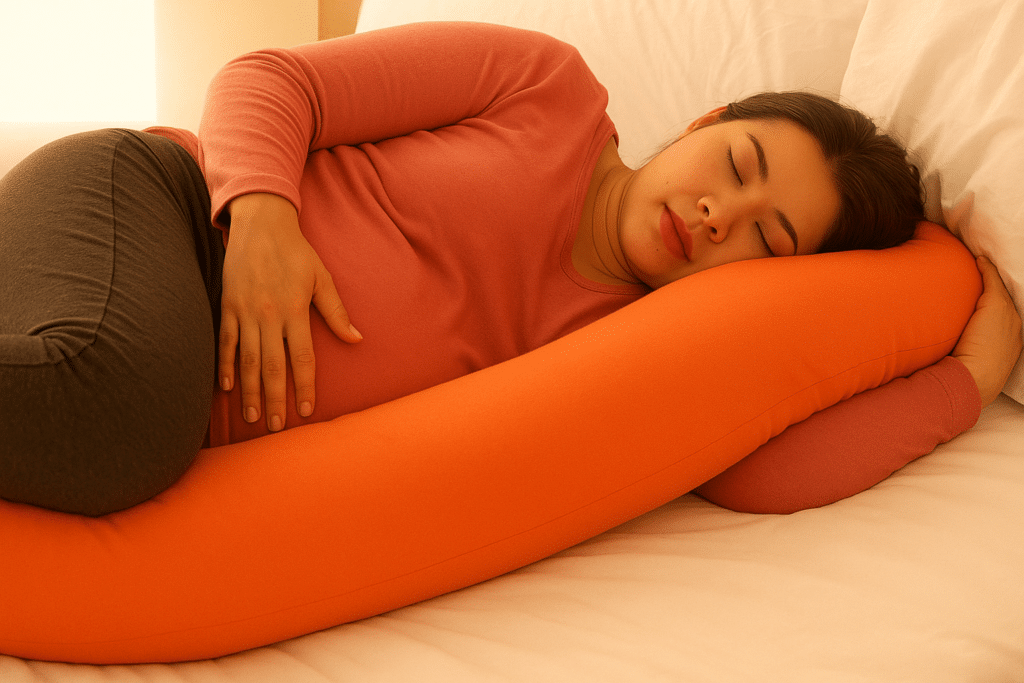Say Goodbye to Waking Up With Morning Back Pain

Table of Contents
Why Does My Back Hurt When I Wake Up
Waking up with back pain can turn the morning sour quickly. This common discomfort affects people worldwide every day. Arm yourself with an understanding of what causes morning back pain and practical solutions you can build into your daily routine. This article navigates potential reasons behind morning back aches and offers evidence-based techniques to help start your days fresh and pain free.
Small adjustments to your sleep and morning routines can provide relief so you can rise with minimal discomfort. Implementing proper sleep posture, stretches upon waking, and maintaining spine friendly habits allows you to tackle the morning bright eyed and ready to take on the day.
Key Takeaways
- Sleeping in an unsupportive position or on a poor-quality mattress can cause morning back pain.
- Pregnancy, degenerative disc disease, and fibromyalgia are common causes of morning back stiffness.
- To relieve morning back pain, adjust your sleep position or mattress, take it slow when getting up, perform morning stretches, and stay active throughout the day.
- Consult with a healthcare provider for personalized advice and treatment options.

Causes of Morning Back Pain
Sleeping in an unsupportive position or on a poor quality mattress can contribute to morning back stiffness.
Sleeping in an unsupportive position
Sleeping in an unsupportive position frequently results in severe lumbar soreness when getting up. The spine endures much pressure, leading to discomfort upon waking up. Often, it’s the poor body alignment during sleep that causes this issue, with stomach sleeping being a prime offender due to its lack of spinal support.
Alongside this, using a mattress that fails to adequately support your weight or shape exacerbates these issues further. A poor-quality mattress can hinder your body’s natural recovery processes during sleep and increase muscle and joint discomfort by morning.
Therefore, understanding how incorrect sleeping positions and inadequate mattresses contribute significantly could be key to managing your back soreness after sleep more effectively.
“Proper spinal alignment during sleep is crucial. I often recommend patients experiment with pillow placement or mattress firmness to find what allows their neck and back to rest in a neutral position.” Dr. Zach Bruley, chiropractor
Poor mattress quality
Poor mattress quality stands as a significant contributor to morning back stiffness. A worn out, deteriorated mattress often fails to provide the required support for your spine and can exacerbate discomfort during sleep.
This lack of support from an old or inferior bed may lead to misalignment of the spine and create painful pressure points on various parts of the body.
The softness or firmness level greatly affects sleep surface quality. If it’s too soft, one might sink into positions that strain the neck and back. Conversely, if it’s too hard, it can place undue stress on your shoulders, hips, and lower back.
The right balance ensures proper posture during sleep which is vital for maintaining good back health over time. To alleviate existing pain or prevent future issues, consider investing in a high-quality replacement mattress that suits your sleeping needs.
“There are some great mattresses designed specifically to support the back and minimize pressure points that lead to pain. Investing in one of these quality mattresses can really improve your mornings.” Dr. Evan Norum

Pregnancy
Pregnancy often triggers changes in the body that contribute to morning back pain. As your body prepares for childbirth, hormones cause ligaments to loosen, which can lead to discomfort.
A growing baby bump may also cause you to lean backwards, straining lower back muscles over time. It’s vital not to overlook pregnancy related back pain as it could also signal other conditions like urinary tract infections or even the onset of labor.
The occurrence of low back pain during pregnancy is particularly common during early stages and measures should be taken for relief and comfort.
Degenerative disc disease
Degenerative disc disease is one of the most common causes of morning back pain. It occurs when the discs in the spine start to deteriorate and lose their cushioning ability. This can result in pain, stiffness, and compression of the spinal nerves.
Normal age related wear and tear can lead to degenerative disc disease, making it more common in individuals over the age of 40. Lifestyle habits, such as poor posture or excessive sitting, can also contribute to this condition.
If you experience lower lumbar pain when waking up in the morning, degenerative disc disease may be a possible cause that should be evaluated by a healthcare provider.
Fibromyalgia
Fibromyalgia is a condition that can contribute to morning back pain. Along with lower spine pain, people with fibromyalgia may experience fatigue, sleep problems, difficulty concentrating, headaches, depression, and anxiety.
This complex condition can also cause pain that wakes them up at night or other sleep disturbances like restless leg syndrome or sleep apnea. Fibromyalgia is known for its wide range of symptoms including musculoskeletal pain, tender points, cognitive dysfunction (sometimes referred to as “fibro fog”), mood disorders, and chronic fatigue.
How to Relieve Morning Back Pain
To relieve morning back stiffness, adjust your sleep position or mattress, take it slow when getting up, perform morning stretches, stay active throughout the day, and consult with a healthcare provider.
Adjust sleep position or mattress
To relieve morning back pain, try adjusting your sleep position or mattress. Here are some tips:
- Experiment with different sleeping positions to find what works best for you and your back.
- Use a pillow that provides proper support for your head and neck, helping to align your spine.
- Consider investing in a mattress that offers adequate firmness and support.
- If you sleep on your side, try placing a pillow between your knees to help keep your spine aligned.
- If you sleep on your back, consider placing a small pillow under your knees to take pressure off of your lower back.
- Avoid sleeping on your stomach, as it can cause the lower spine to extend and place it under pressure.
“Changing sleep positions can make a huge difference in alleviating back pain symptoms. Sleeping on your side in the fetal position with a pillow between your knees is ideal for maintaining spinal alignment.” Dr. Zach Bruley
Take it slow when getting up
When experiencing morning back pain, it is important to take it slow when getting up. Rushing out of bed can aggravate the pain and lead to further discomfort throughout the day. Instead, give yourself a few extra minutes in the morning and gradually ease into an upright position.
“Getting up slowly and gently is key to preventing lumbar soreness when getting up in the morning. Take a few minutes to slowly stretch and rotate your back before fully standing up out of bed. This eases the transition for your muscles and spine.” Dr. Evan Norum, chiropractor
This allows your muscles and joints to adjust while minimizing strain on your lower lumbar region. By taking it slow, you can start your day off on a more comfortable note and help alleviate morning back stiffness.
Perform morning stretches
Performing morning stretches can help alleviate lumbar soreness when getting up and improve flexibility and spinal alignment. Here are some recommended stretches that you can try:
- Single knee to chest stretch: Lie on your back with your knees bent and feet flat on the floor. Slowly bring one knee towards your chest and hold it with both hands for 15-30 seconds. Repeat with the other knee. Watch quick video here.
- Double knee to chest stretch: Similar to the single knee to chest stretch, but this time bring both knees towards your chest at the same time. Hold for 15-30 seconds. Watch quick video here.
- Lower trunk rotations: Lie on your back with your knees bent and feet flat on the floor. Gently rotate your lower body from side to side, keeping your shoulders flat on the ground. Repeat this movement for 10-15 repetitions on each side. Watch quick video here.
Stay active throughout the day
Staying active throughout the day is crucial for relieving lumbar soreness when getting up and improving sleep quality. Engaging in simple activities like walking or light exercises can help strengthen your muscles, reduce stiffness, and promote better blood flow to your back.
“Staying active with low impact exercise helps strengthen your back and core muscles. I suggest easy daily activities like walking, swimming, or yoga to my patients suffering from morning back discomfort.” Dr. Taylor Moore, chiropractor
Regular movement helps to keep your spine properly aligned and prevents the buildup of tension and pressure on your lower back. It’s important to note that being active and exercising will not make your back pain worse; in fact, it can actually help you feel better over time.
So make it a priority to incorporate regular physical activity into your daily routine for long lasting relief from back soreness after sleep.
Consult with a healthcare provider
To effectively address and find relief for your lumbar soreness when getting up, it is highly recommended that you consult with a healthcare provider. These professionals, such as doctors, chiropractors, or physical therapists, have the expertise to accurately diagnose the underlying causes of your discomfort and provide appropriate treatment options.
They can also help rule out any serious conditions that may be contributing to your morning back stiffness, including cancer. By seeking their guidance and advice, you can receive personalized care tailored to your specific needs and improve your overall quality of life.
Additional Tips and Treatments for Morning Back Pain
To further alleviate morning back pain, consider incorporating light exercise, over the counter medications when appropriate, and focusing on overall healthy lifestyle habits. These supplementary options used alongside the core prevention methods already outlined can provide enhanced relief by targeting discomfort from multiple angles.
Use OTC medications or topical remedies
To find relief from morning back pain, there are several over the counter (OTC) pain medications and topical remedies that you can try. These nonprescription options can provide immediate relief for severe back pain. Some common OTC medications include ibuprofen and acetaminophen, which can help reduce morning pain.
Additionally, there are topical analgesics such as ointments and creams that you can apply directly to the affected area. While these remedies have shown inconsistent effectiveness in the treatment of chronic back pain, they may still provide temporary relief for some individuals. It’s important to consult with your healthcare provider before starting any new medication or treatment option.
Incorporate regular exercise
Regular exercise is key in relieving morning back pain. Here are some tips to help you incorporate exercise into your routine:
- Strengthen your back muscles: Engage in exercises that target the muscles in your back, such as back extensions and bird dogs.
- Work on your hips: Hip exercises like bridges and hip rotations can help improve stability and reduce the strain on your lower back.
- Strengthen your torso: Core exercises like planks and Russian twists can enhance the support for your spine.
- Include aerobic exercises: Activities like walking, swimming, or cycling can increase blood flow to your back muscles, promoting healing and pain relief.
- Avoid overexertion: It’s essential to listen to your body and avoid pushing yourself too hard during exercise to prevent worsening of back discomfort when getting up from bed.
- Maintain regular physical activity: Consistency is key when it comes to exercise. Aim for at least 30 minutes of moderate intensity activity most days of the week.
Upgrade Your Mattress & Pillow
Investing in the right sleep essentials can make a world of difference in your comfort and spinal alignment. Below, we’ve compiled recommendations for various types of mattresses and pillows that are designed to provide optimal support and relieve back pain.
Mattress Recommendations:
- Memory Foam – Memory foam mattresses contour to the body’s shape and relieve pressure points. Brands like Tempur-Pedic and Leesa make high-quality memory foam mattresses.
- Hybrid – Hybrid mattresses combine memory foam and coil springs to provide contouring and bounce. Popular brands include Helix, Purple, and Casper.
- Adjustable Air – Sleep Number and AirPedic offer adjustable air mattresses with customizable firmness for spinal support.
- Innerspring – Traditional coil mattresses like those from Stearns & Foster and Saatva provide a firm, responsive sleep surface.
Pillow Recommendations:
- Cervical – Contour pillows like Coop Home Goods provide neck support and maintain spinal alignment.
- Wedge – Place under knees or lower back to relieve pressure. Brands like InteVision make quality wedge pillows.
- Body – Full-length body pillows promote side-sleeping posture. Try pillows from Squish or PharMeDoc.
- Buckwheat – Adjustable, molds to head and neck shape. Sobakawa and Sleepwish offer buckwheat pillows.
- Memory Foam – Memory foam pillows like Tempur-Pedic reduce neck pain and stiffness.
Conclusion
In summary, morning back pain can result from various factors such as poor sleeping positions and inadequate mattress support. However, incorporating small adjustments provides solutions to start your days fresh and discomfort free. Focus on proper sleep posture and invest in a high-quality mattress suited to your needs. Take time to stretch and slowly transition from bed. Stay active to build back muscles and maintain alignment.
Consult a healthcare professional for personalized treatment guidance as well. Properly equipping yourself with spine-friendly habits and expert advice alleviates morning back stiffness. Don’t let discomfort in the AM prevent you from embracing each new day. With practical lifestyle tweaks and care for your back, you can greet every morning energized and pain-free.
“Ignoring persistent back pain is never advisable. Be sure to consult a medical professional if discomfort persists for more than a few days to properly diagnose and treat the underlying issue.” Dr. Taylor Moore
FAQs
- Why does my back hurt when I wake up?
Back pain when waking up can be caused by several factors, including poor sleeping posture, an unsupportive mattress or pillow, muscle tension or strain, and underlying medical conditions.
- How can I prevent back pain when waking up?
To prevent back pain when waking up, try maintaining a proper sleep posture by using a supportive mattress and pillow. Stretching before bed and practicing good posture throughout the day can also help alleviate discomfort.
- When should I seek medical attention for back pain when waking up?
If your back pain persists or worsens over time, is accompanied by other symptoms such as numbness or weakness in the legs, or if you have a history of spinal injury or condition, it is recommended to consult with a healthcare professional for further evaluation.
- Are there any exercises that can help relieve morning back pain?
Yes, gentle stretching exercises targeting the lower back and hips may provide relief from morning back pain. However, it’s important to consult with a healthcare professional or physical therapist before attempting any new exercise routine.
- What lifestyle changes can help reduce morning back pain?
Maintaining a healthy weight through regular exercise and proper nutrition can help alleviate stress on your spine and reduce morning back pain. Additionally, avoiding prolonged sitting or standing positions and practicing good body mechanics during daily activities are beneficial for preventing discomfort upon waking up.

About the Author
Dr. Evan Norum, co-owner of Advantage Chiropractic in New Berlin, WI, holds a Doctorate of Chiropractic from Northwestern Health Sciences University. Inspired by personal experiences with chiropractic care, he specializes in family-based treatments and is board-certified in chiropractic care, neuropathy, and the Torque Release Technique®. With internships at leading chiropractic centers and co-founding Advantage Chiropractic in 2017, Dr. Evan Norum is dedicated to promoting health from within.
